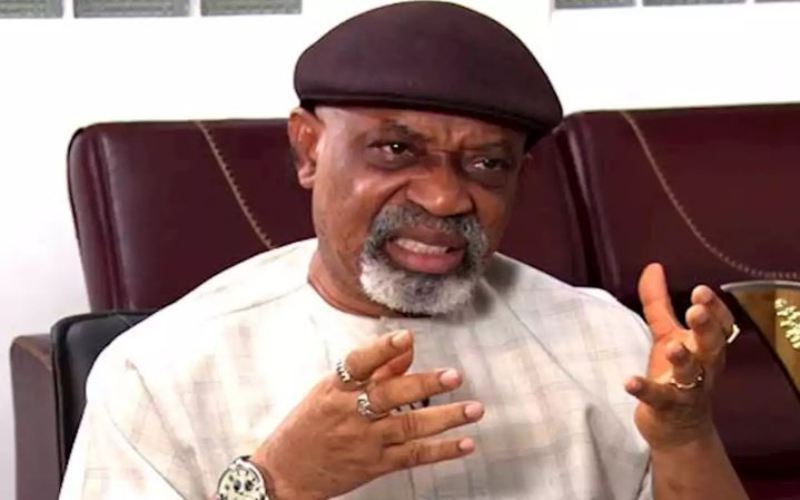The Academic Staff Union of Universities (ASUU) has vowed to resist any attempt to truncate the deployment of University Transparency and Accountability Solution (UTAS) with all legitimate means available to the Union.
TheNewsGuru.com (TNG) reports ASUU President, Prof Emmanuel Osodeke made this known on Monday in a statement issued following a meeting of the union’s National Executive Council (NEC) to review developments since it’s resolution to extend its roll-over strike action by another 12 weeks with effect from 9th May, 2022.
According to Prof Osodeke in the statement, NEC observed the ongoing trial of the suspended Accountant-General of the Federation (AGF), Mr. Ahmed ldris on an allegation of monumental fraud vindicated ASUU’s rejection of the Integrated Payroll and Personnel Information (IPPIS).
The union, therefore, enjoined the National Information Technology Development Agency
(NITDA) to release reports of the latest tests on the UTAS vis-à-vis Integrated Payroll and Personnel information system (IPPIS) without further delay.
Osodeke explained that the NEC meeting took place against the backdrop of the government’s obligations as spelt out in the Memorandum of Action (MoA) it signed with ASUU on 23rd December 2020.
“Specifically, NEC recalled that government’s failure to conclude the process of renegotiating the 2009 FGN/ASUU Agreement, deploy the University Transparency and Accountability Solution (UTAS), pay outstanding arrears of Earned Academic Allowances (EAA), release agreed sum of money for the revitalization of public universities (Federal and States), address proliferation and governance issues in State Universities, settle promotion arrears, release withheld salaries of academics, and pay outstanding third-party deductions led to the initial declaration of the roll-over strike on 14th February, 2022.
“NEC viewed with seriousness the recent directive given by the President and Visitor to all Federal Universities that the Minister of Education, in consultation with other government officials, should resolve the lingering crisis and report to him within two weeks. The Union wonders why it had taken five full months and needless muscle-flexing tor government to come to the realisation of the need tor honest engagement.
“NEC acknowledged the growing understanding of the issues and the groundswell of support for the Union’s principled demand for a globally competitive university education in Nigeria. Nigerian universities must not be reduced to constituency projects that merely exist on paper and our scholars must be incentivised to stay back and do what they know best, here in Nigeria.
“NEC appreciated the historic nationwide protest of 26th and 27th July, 2022 organised by the Nigeria Labour Congress (NLC) in collaboration with Civil Society Organisations (CSO) to further create awareness on the antics of the Nigerian ruling class to destroy public education. ASUU renews its commitment to the struggles of NLC in championing the cause of the working and suffering Nigerians.
6. NEC observed that non-signing of the draft renegotiated 2009 FGN-ASUU Agreement more than one month after it was concluded by Professor Nimi Briggs-led Committee is further tasking the patience of ASUU members nationwide.
“NEC further observed that the on-going trial of the suspended Accountant-General of the Federation (AGF), Mr. Ahmed ldris, on allegation of monumental fraud has vindicated ASUU’s rejection of the Integrated Payroll and Personnel Information (IPPIS). The National Information Technology Development Agency (NITDA) is enjoined to release reports of the latest tests on the University Transparency and Accountability Solution (UTAS) vis-à-vis IPPIS without further delay. ASUU shall resist any attempt to truncate the deployment of UTAS with all legitimate means available to the Union.
“NEC noted that cumulative indifference by the political class gave vent to pervasive atmosphere of insecurity which now threatens seamless provision of educational services in the country. The unceremonious closure of educational institutions in the Federal Capital Territory (FCT), following the recent attack on Presidential Guards, betrays a panicky measure to addressing a malignant ailment. Nothing short of a comprehensive overhaul of the security architecture of the country will sustainably address the problem.
“Following extensive deliberations and taking cognisance of Government’s past failures to abide by its own timelines in addressing issues raised in the 2020 FGN/ASUU Memorandum of Action (MoA), NEC resolved that the strike be rolled over for four weeks to give Government more time to satisfactorily resolve all the outstanding issues. The role-over strike action is with effect from 12.01a.m. on Monday, 1st August, 2022,” a statement issued by the ASUU President at the end of the meeting reads.


